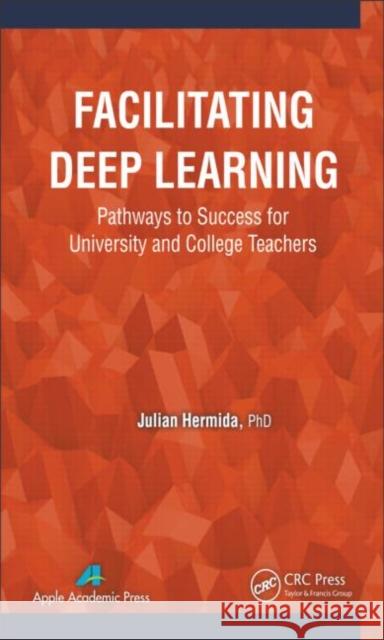Facilitating Deep Learning: Pathways to Success for University and College Teachers » książka
Facilitating Deep Learning: Pathways to Success for University and College Teachers
ISBN-13: 9781771880053 / Angielski / Twarda / 2014 / 370 str.
Facilitating Deep Learning: Pathways to Success for University and College Teachers
ISBN-13: 9781771880053 / Angielski / Twarda / 2014 / 370 str.
(netto: 533,14 VAT: 5%)
Najniższa cena z 30 dni: 556,35
ok. 16-18 dni roboczych.
Darmowa dostawa!
Deep learning is a committed approach to learning. It is a process of constructing and interpreting new knowledge in light of prior cognitive structures and experiences, which can be applied in new, unfamiliar contexts. Deep learning produces learning that lasts a lifetime; and it results in better quality learning and profound understanding. In contrast, surface learning involves a dispassionate approach to learning. The surface learner is not concerned with understanding. Information acquired is usually lost after examinations; and there is no profound understanding or knowledge construction. Research studies show that most university and college students today take a surface approach to learning. The purpose of this book is to show readers how to create a learning environment that promotes deep learning in their classes. The book will do so by providing readers with the theoretical and pedagogical tools needed to: Understand the notion of deep learning Design and implement courses that encourage students to take a deep approach to learning Design engaging and innovative teaching and learning activities that encourage students to use higher-order cognitive skills to construct knowledge and negotiate meaning Implement assessment tools aimed at facilitating the deep learning process Support international and other nontraditional students to construct learning deeply. The book begins with an examination of the big picture: the institutional constraints that hinder a culture of deep learning. From there, it deconstructs the concept of deep learning, and it examines every element of the deep learning process. It also discusses the factors that contribute to produce a deep learning environment. The rest of the chapters are about how to facilitate deep learning. The book examines every component of the teaching and learning system: goals, performances, and evaluation. It discusses strategies and methods that teachers can adopt to help students learn how to read and write in their disciplines in a deep way. The book also discusses the notion of inclusive deep learning environments which focus on engaging nontraditional students.











